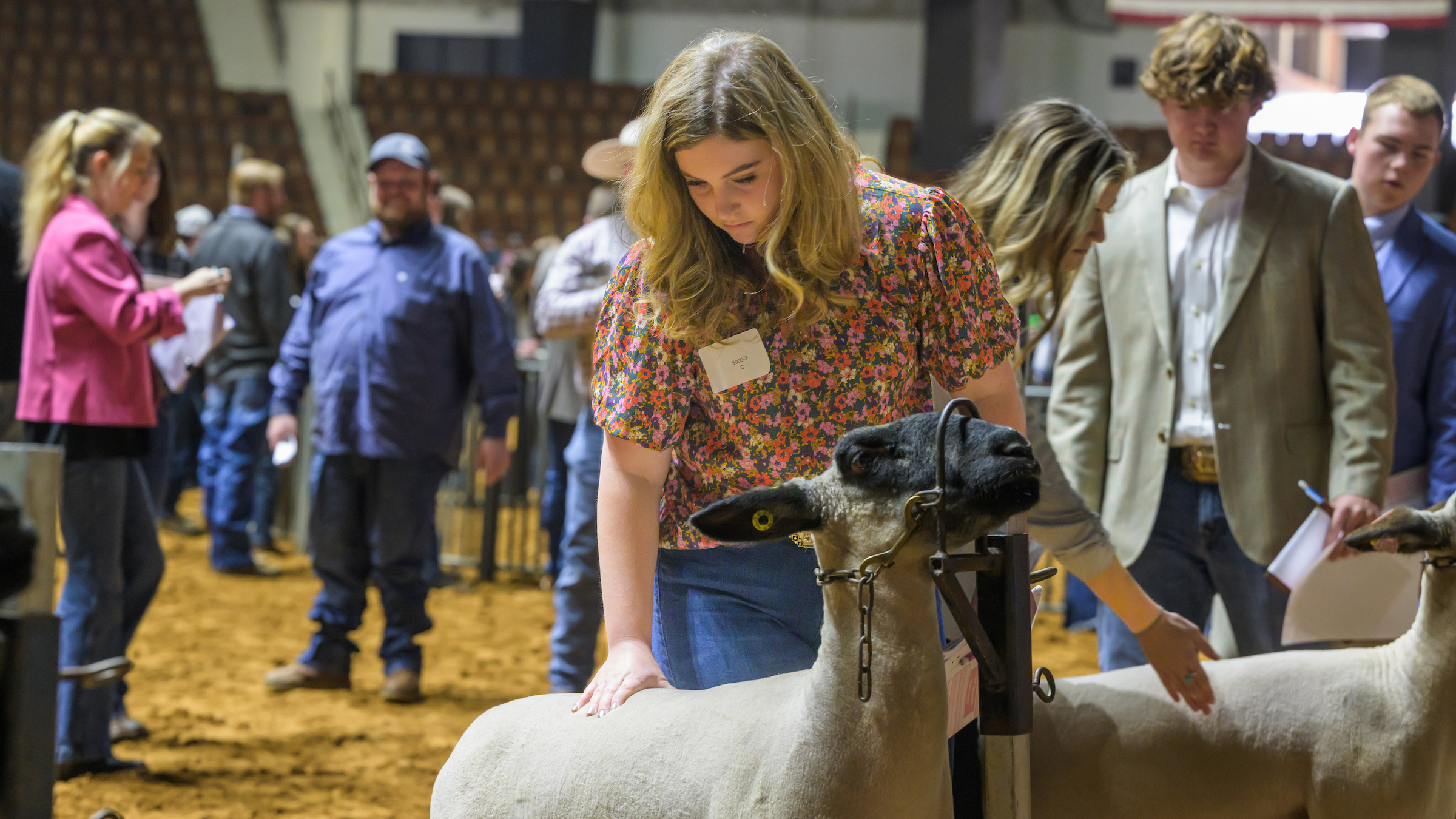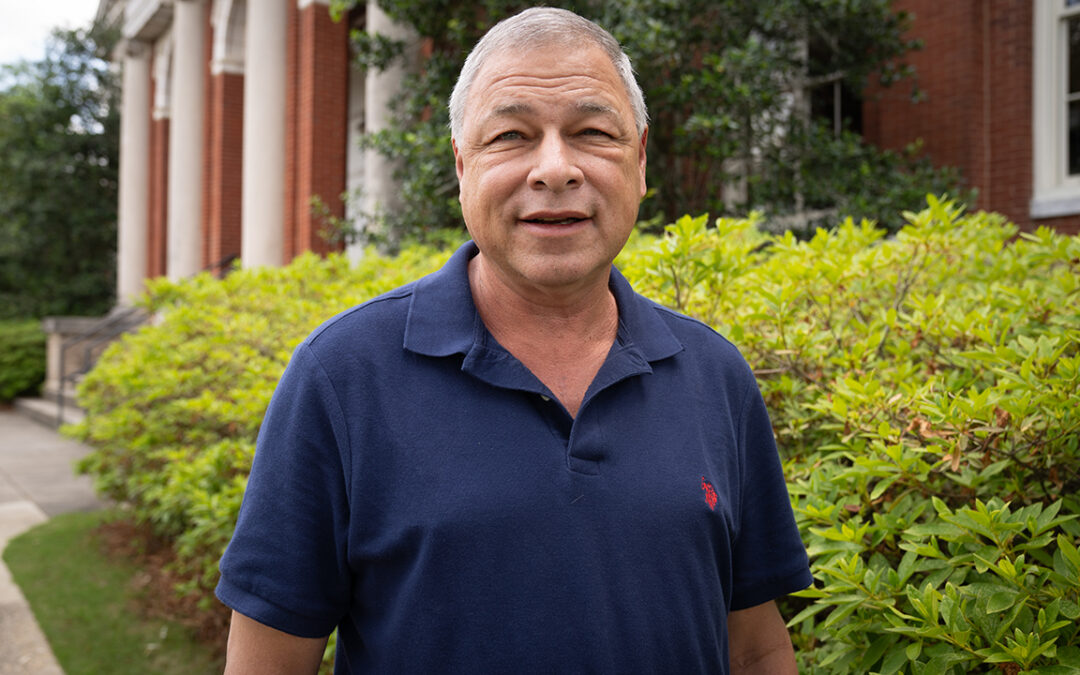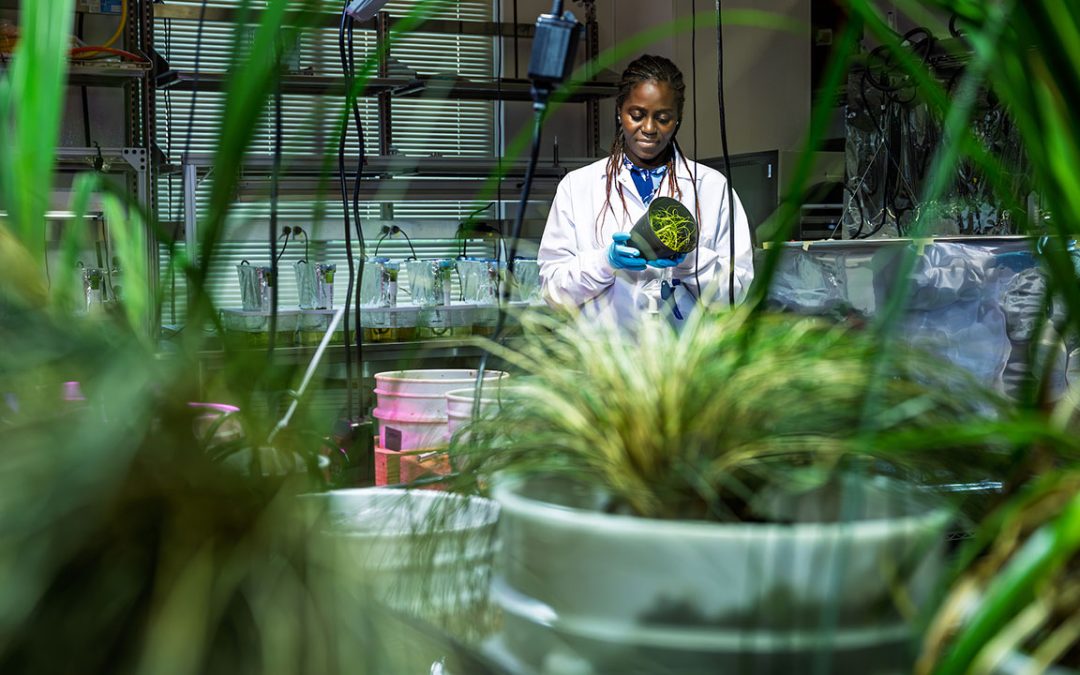By Mike Jernigan
Imagine, if you will, the mental stress and intensity of a formal student debate, but with cattle, pigs, sheep and goats both as the audience and the topic of discussion. Sound like a chapter from George Orwell’s Animal Farm? It’s not. Instead, welcome to the world of competitive livestock judging.
At the collegiate level, the ultimate goal of livestock judging is for student team members to match their individual perceptions of an animal against what is considered the absolute ideal, then rank it by class. In order to be successful, participants must have a good understanding of how ideal is defined for a number of particular species and breeds of both genders. A scoring system then matches each student evaluator’s impressions against a predetermined score. Students must also orally defend their scores before their opponents and a panel of judges.
“Livestock judging gets our students out of the classroom and into real-world learning activities,” said Wayne Greene, head of the College of Agriculture’s Department of Animal Sciences, which houses Auburn University’s new team. “It provides them with experiential learning through the development of decision-making skills that will launch them into successful careers as future agriculture leaders.”
That’s why the college re-established its competitive Livestock Judging Program in 2021, bringing in Jonah Biensch from Texas Tech University as its first head coach, followed by Sarah Jane French in 2023 as the current head coach.
It’s not the first livestock judging program at Auburn, but it is the first for nearly two decades: The last Auburn team to compete at the National Contest was in 1995.
“We have re-invigorated the program and given it new life,” Biensch said in 2021. “There is tremendous support for this group from within the department and college, as well as from previous livestock judging alumni, industry stakeholders and policymakers.”
The current team also has a long tradition behind it, even if the College of Agriculture’s participation in collegiate livestock judging competition has been hit or miss over the years. Teams have come and gone according to funding, reorganization or changing priorities. But the program’s earliest history goes all the way back to the early decades of the twentieth century.
In 1918, according to former faculty members Joe Yeager and Gene Stevenson’s history of the college entitled Inside Ag Hill, an Auburn “stock judging” team won first place at the Southeastern Fair in Atlanta, competing against teams from other agricultural colleges in Georgia, Florida and South Carolina. The first formal Auburn courses in livestock judging were offered two years later in the then-Department of Animal Husbandry.
After a long lapse, an Auburn livestock judging team coached by Professor J.R. Orr traveled to Chicago in 1953 to participate for the first time in the Intercollegiate Judging Contest at the International Livestock Exposition. Still later, in 1985, another Auburn team was crowned national champions in swine judging and swine evaluation. But after 1995, the program lapsed into inactivity once more before returning with the hiring of Biensch and funding help from the College of Agriculture, the Alabama legislature and the Alabama Farmer’s Federation, among others.
The reborn team had seven members, including Will Jordan, Jacob Sizemore, Nathan Brown, Coleman McNaughton, Cole Lincoln, Sarah Howard and Juliana Rezek. All of them were from the College of Agriculture but represented a variety of majors.
According to Jordan, most of them came to the team because of backgrounds in raising or showing livestock as kids. And even in its first two years, the team already experienced success, placing in the top ten in multiple contests and winning individual honors.
“Livestock judging is unique in that it pushes you to develop interpersonal skills, decision making skills, public speaking skills and mental toughness,” said Jordan, who graduated in May 2023 with a Bachelor of Science in agricultural communications and a minor in animal sciences.
According to Jordan, a judging practice — or “workout,” as they are called — may involve hundreds of miles, several days, and a dozen stops at different farms and ranches to sort through cattle, hogs, sheep and goats. And a collegiate judging contest typically starts by 8 a.m. and may last into the evening.
The kicker? It’s silent, except for the scratching of pens and echoes of animal sighs and grunts.
“No talking to teammates is allowed,” Jordan said. “A contest consists of 12 classes of livestock with four animals in each class. Eight classes are called reasons classes, where you defend your placing of the livestock to the judge whose placing was used as the official score.”
Jordan said the competition feels intense, due to the silence and individual nature of the tasks. It can be mentally draining as well as rewarding.
“The skills and relationships developed through livestock judging are irreplaceable and beneficial to those involved in production agriculture or any other career field,” he said.
Jordan’s teammate McNaughton wants to pass those skills on to future livestock judgers. In 2022, he had already started coaching high schoolers in preparation for future state 4H contests.
Jordan said he believes the future is bright for the team as it adds to the tradition and record of success of the teams that came before it.
“I would love to see Auburn’s livestock judging team be supported by alumni, faculty, staff, fellow students and donors,” he said. “Auburn could use facilities to enhance teaching of livestock evaluation. I would also like to see Auburn become a competitive recruiter of students from western junior college judging teams. And to become a competitive recruiter, Auburn needs folks to invest in this valuable program.”





